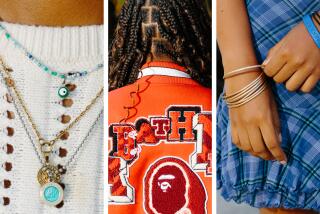Students Get Lesson in Bias at This Camp
It wasn’t your typical weekend camp experience.
Sure, the young people partook of the usual camp activities such as barbecues and sing-alongs. But the 116 Alhambra High School students at Camp Max Straus in Glendale earlier this month were there for more serious reasons.
The students were there as part of Project Brotherhood/Sisterhood, sponsored by the National Conference of Christians and Jews, to devise an “action plan” to combat racism and stereotypes at their school.
But before they were able to write up their plan, they were required to confront some difficult personal feelings.
On the second day of the three-day camp, the students were asked to imagine themselves as a member of the race or ethnic group they felt least comfortable with. They then anonymously answered a questionnaire, maintaining the imagined racial identity.
During group discussion later many students expressed anger and hurt over some of the responses.
When people who imagined themselves as black answered the question, “What is the worst thing you could do?” they tended to dwell on criminal acts. Tamera Henderson, a black sophomore, was offended by the responses.
“It hurts that they are saying these things about blacks, and it makes me feel like no one wants me here,” she said.
Debbie Martin, a white senior, was angry about comments made about white people during the discussion.
“I’m sick and tired of whites being blamed for all the prejudices,” she said, pointing out that there were more Latinos and Asians in the room than whites. “I get hurt by that, because I feel like I’m not getting a chance.”
Of the school’s 3,500 students, 55% are Asian, 33% are Latino and fewer than 1% are black, according to Alhambra High’s assistant principal, Tony Ortega. Most of the remaining students are white.
The recent influx of Asians has caused some tension in Alhambra, and some of those feelings have spilled over into the school system. School district officials, noting the changing mix of students, believed the weekend camp would help students overcome stereotypes and prejudices about other racial and ethnic groups.
Despite the difficult subjects encountered, when the conference ended the next day the students were optimistic because of what they had learned and excited about their plans for their school.
Freshman Monica Estrada said she learned to not prejudge people based on their race or what they look like.
Sophomore Sandra Chamorro said she had refused to allow other people’s stereotypes to bother her. But the discussion taught her that each person reacts differently.
“I didn’t realize that (some) people get really hurt,” she said.
Sophomore Gina Farrar said, “Now I’ll think before I say things about a whole race, because people get hurt by stereotypes.”
As part of their action plan, the students plan to start a peer counseling program and start clubs to learn about different cultures. They also would like to see the NCCJ camp program used at elementary schools, offering younger students the same opportunity they had.
More to Read
Sign up for Essential California
The most important California stories and recommendations in your inbox every morning.
You may occasionally receive promotional content from the Los Angeles Times.










